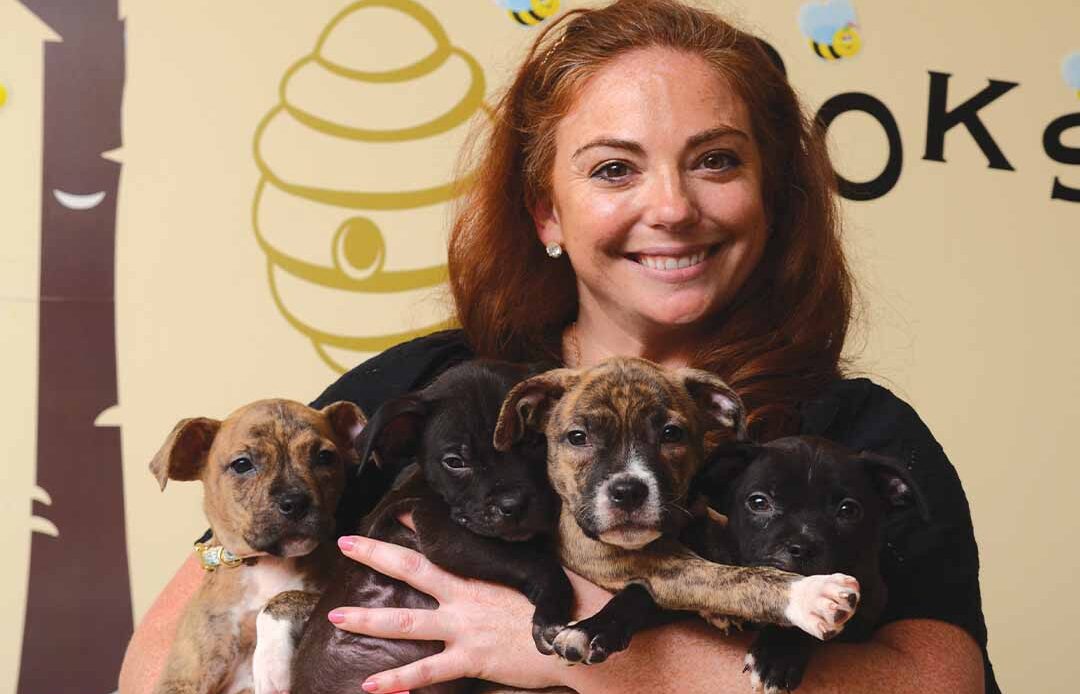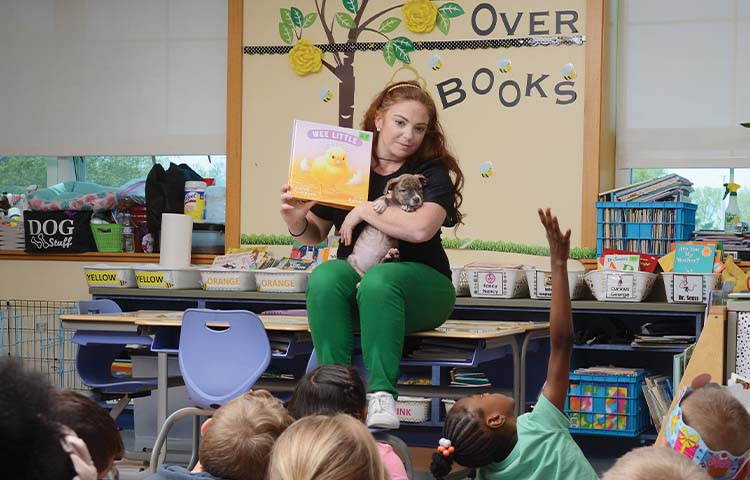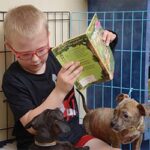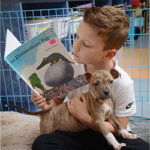Puppy Love

Puppies in classrooms: It was an alumna’s idea that went viral, captivating the international media while improving reading scores.
If happiness is a warm puppy, as “Peanuts” cartoonist Charles Schultz opined, the first graders in Wilmington University alumna Brooke Hughes’ class are the most jubilant youngsters at Hanby Elementary School in North Wilmington.
The students also are dramatically improved readers, a fact attributed, in large part, to an innovative program in which children read aloud to puppies that are being fostered in the classroom.
“I started fostering puppies at my home during the pandemic while I was teaching virtually,” Hughes says. “Once we went back to the physical classroom, I kept thinking about all the wonderful benefits that puppies could bring to the culture of our school.”
She came up with a pilot plan for Foster Tales Puppy Therapy, in which first graders would care for puppies awaiting adoption at Rags 2 Riches Animal Rescue in nearby Garnett Valley, Pennsylvania. The puppies would stay in a pen in the classroom during the day and go home with students, teachers, or school staff at night. During the puppies’ nap time, students would snuggle with the pooches and read to them from children’s books.
In her proposal, the teacher addressed such concerns as allergies — puppies less than four months old haven’t yet developed dander — and teaching kids to distract rambunctious pups with a toy. Puppies would take regular bathroom breaks outside. Those that aren’t housebroken can’t come out of the pen, which is outfitted with artificial grass.
Hughes floated her proposal for the pilot to Juliet Agresti, Hanby’s principal, who agreed to a one-day tryout. The teacher immediately put a plan into action, enlisting the support of her students’ parents.
“I never had permission slips come back so fast,” she recalls.
The pilot rolled out on the day before the holiday break in December 2022, starting with three puppies. Students read one-on-one with a foster pet during the puppies’ frequent snoozes.
“It brought a calming, joyful experience to the whole school,” Hughes says.
The pilot was a resounding success with students and staff. Puppy therapy got a green light from the principal, becoming part of the reading education plan when the kids returned to school in January 2023.

Since then, the extra time kids put into reading has propelled a 32% improvement in scores, according to reading data collected before and after the puppy program was rolled out. Hughes, her students, and their four-footed friends have become media darlings, appearing on ABC Nightly News with David Muir, Good Morning America, and various Philadelphia TV stations. USA Today, People magazine, and Newsweek shared the good news. And a TikTok video of children reading to puppies went viral.
Hughes, who earned a master’s degree in Elementary Education and Teaching at WilmU in 2013, says her academic experience helped her develop the critical thinking required to plan and implement a new and untested program.
“At Wilmington, every education class allowed for creativity and individual freedom. It’s about thinking outside the box and having the confidence to use your passions to create something new and exciting,” she says.
“This program perfectly exemplifies how innovative thinking and a passion for education can come together to create meaningful change,” says College of Education and Liberal Arts Dean Dr. Tyler Wells. “Brooke’s initiative of integrating puppies into the classroom has not only improved reading scores but also fostered a sense of empathy and responsibility among the students. It’s inspiring to see how our alumni continue to make such a profound impact in their communities.”
Startup costs for Hughes’ program were $1,704 for such expenses as a portable pet crate, potty pads and toys, raised mainly through donations from donorschoose.org, a popular crowd-funded website that teachers utilize to raise money for supplies. Parents and animal rescue supporters also chipped in through a wish list on the Amazon website and individual donations.
For schools and teachers who want to replicate her model, Hughes has created a proposal slideshow and document, available for purchase on Amazon and her website, https://fostertalespuppytherapy.com. A Foster Tales guide containing the proposal, sample permission slip, lesson plans, and classroom management tools will launch soon in response to demand.
“We’ve had inquiries about school puppy therapy from as far away as London,” she says.
“Brooke’s initiative . . . has not only improved reading scores but also fostered a sense of empathy and responsibility among the students. It’s inspiring to see how our alumni continue to make such a profound impact in their communities.” — Dr. Tyler Wells
Hughes understands the natural bond that develops between affectionate, nonjudgmental puppies and young children. “Growing up, I asked for a puppy every single day,” she recalls.
When she was 10, her parents presented her with Coby, a Shetland sheepdog, who took puppy training classes with her. “I was a very shy kid. I talked to Coby more than I did my parents, that’s how close we were,” she says.
Academic studies support the theory that animals can help draw children out of their shells. As part of a study published in 2023 in the Journal of Veterinary Behavior, 118 school leaders, teachers, mental health professionals and researchers concluded that therapy dogs in educational settings help facilitate improvements in students’ social and learning engagement, as well as their emotional and behavioral well-being.
Hughes’ classroom includes students of varying abilities and behaviors, including children who don’t raise their hands and two children who use electronic communication devices to express their needs.
One of the youngsters who had not previously spoken in class broke his silence to tell a puppy a story.
“He verbally read an above-grade-level book fluently to the puppy,” the teacher recalls. “It was a remarkable moment.”
Principal Agresti says the puppies are making a positive impact on the school culture of support, safety, and compassion.
“Being with the puppies has helped many of our Hanby Bees to gain the courage to read when hesitant, transition into the building when anxious, meet behavior expectations when needing motivation, and communicating when language is a challenge,” she says. “In addition, the puppies have been a wonderful boost for our school climate. Teachers need a snuggle, too, when they have a tough day.”
That includes Hughes, who loves dogs but can’t manage one at her home in Philadelphia.
“I have my job at Hanby, plus advising gymnastics and cheerleading,” she says. “I’m not home enough to take proper care of a dog, so it’s extra meaningful for me to work with the puppies.”
Like children, puppies come in different shapes and sizes with their own individual personalities. The smallest pup so far at Hanby was a tiny chihuahua mix. The biggest puppies were Charlotte and Wilbur, five-month-old pitbull mixes named for the characters in the classic children’s book “Charlotte’s Web.”
“They weighed more than the kids,” Hughes says.
So far, more than 60 puppies have found forever homes, many with students, teachers, and school staff. Jemmi, a pitbull chihuahua mix adopted by a student’s family, gets daily pets from the children who fostered her when her new owner walks her to the bus stop.
Most of the puppies are transferred to the Pennsylvania shelter from Texas or North Carolina, the first step on their journey from abandonment to adoption. “They were either dumped at a shelter or left by the side of the road in a box,” the teacher says. “When the puppies come to school, they are surrounded by children who can’t wait to see them.”
Children get exercise and develop responsibility by walking the puppies during recess. They learn empathy by caring for the puppies, making sure they have food and water, cleaning up after them if needed, and giving them lots of pets and hugs. Third graders volunteer to help the younger children care for their animal friends.
“The students are more empathetic with each other because of the puppies,” Hughes says.
The program has been so successful, Hanby has extended puppy therapy to the summer school curriculum.
It’s a difficult time for the first graders when the puppies are adopted and leave the classroom and their foster friends at Hanby. Hughes reminds her students that preparing puppies for their new homes is an important part of Foster Tales’ mission.
“I taught them the word ‘bittersweet.’ We are sad that we don’t get to see the puppies anymore, but we are happy that they have a home,” she says.






